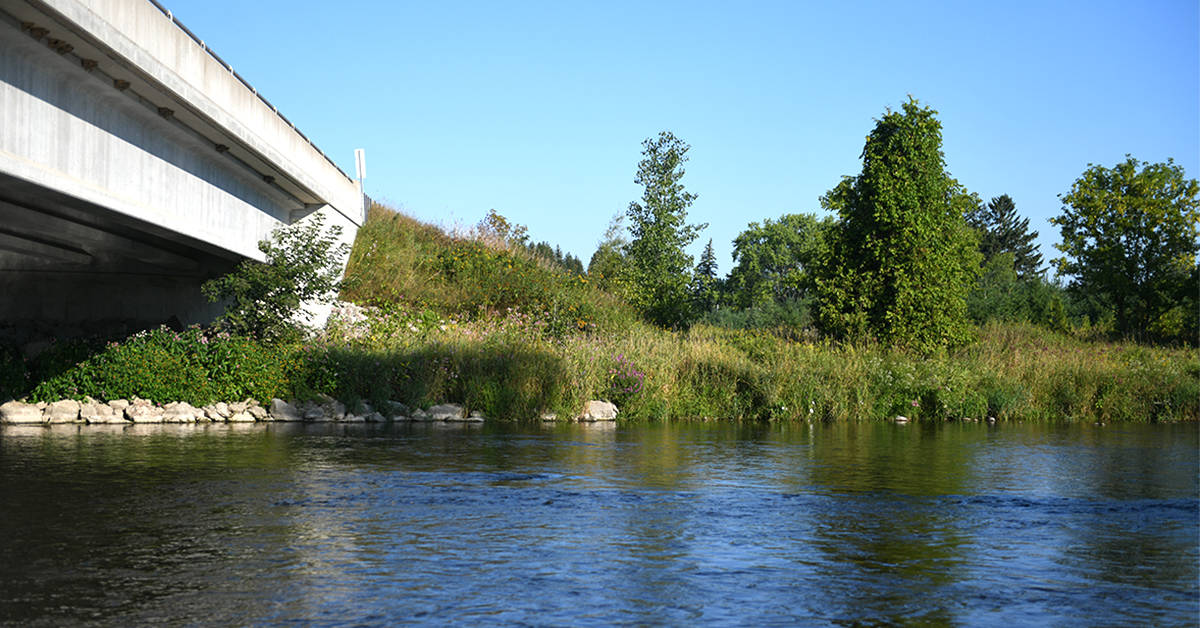Anglers who spend a lot of time on the Grand River have believed for a few years now, that the Grand River’s health is in decline. And now, preliminary findings from the University of Guelph can confirm some of what the anglers are noticing.
Friends of the Grand River is a volunteer organization made up largely of those who regularly fish the river and its tributaries. They help maintain the river and tributaries by planting trees, cleaning up garbage and stocking trout, among other activities.
Since 2019, the organization has collected river observation surveys from its members annually. They receive about 150 responses each year. In the surveys, respondents have indicated they are noticing fewer full grown trout than previous years, and most feel the angling experience is poor to average. Ten per cent of respondents in 2021 felt the angling was excellent.
According to the survey, respondents believe trout predation is up, including increased pressure from anglers. They believe more development and more clearing by landowners all the way to the river banks is widening the river. They are noticing decreased bug life, and are also worried about pollution from sources like road salt, insecticides or household chemicals, among other concerns.
“In real time, our findings are not looking very positive right now,” said Rob Voisin, the chair of the Friends of the Grand River. “We’re trying to build an action plan on how to make sure the river stays healthy and the water is healthy, but we can’t build an action plan until we know what the root cause is.”
Prompted by the survey results, the Friends collaborated with Ryan Prosser, a professor in the environmental science department at the University of Guelph, to formally study the river.
Beginning this summer, Prosser and his lab conducted benthic studies of the level of aquatic insect life in the river, as well as algae levels and temperature, among other studies.
Since benthic (bottom-dwelling) organisms spend all or most of their lives in the water, are easy to collect and their levels of tolerance to pollution are known, they are an indicator of overall health of the system.
The Friends of the Grand River arranged for a similar study in 2000 of 15 sites along the river. Now, Prosser and his lab are sampling the same sites again for their study to determine how the river has changed.
“We’re very interested to see if the benthic macroinvertebrate (small aquatic animals and insects) community has changed over the last 22 years in this section of the Grand River,” Prosser said to The Observer via email.
His lab is also sampling algal blooms in Belwood Lake to test for any harmful algal toxins.
“The concern is that the algal blooms in Belwood Lake may be producing these harmful algal toxins, which are then flushed down the Grand River,” he said.
Along with benthic and algal testing, Prosser and his team are also looking at the temperature data that Friends of the Grand River have been collecting, to see if the temperature of the river has been rising.
The findings so far are just preliminary, says Prosser, but they may confirm the local anglers’ suspicions and observations.
“We’ve just finished our samples for this year but preliminary findings indicate that the benthic macroinvertebrate communities closest to the Belwood Dam are not in great shape, i.e., diversity is relatively low and sensitive species (mayflies, stoneflies) are not present. This is preliminary. We will be analyzing the data in more detail over the fall,” he said.
Ken Collins is a local angler, guide and owner of Grand River Troutfitters in Fergus. He spends much of his time out on the Grand. “The river is changing,” he said to The Observer in an email. “Water quality seems to be its worst enemy. Abundant algae. Way more than in the past.
“Add this to the way-below-average precipitation summer rainfall amounts. No major water increases from the dam due to big rain allows this algae to flourish.”
He has also noticed there is increased pressure on the river from other users.
“More canoeing, tubers, trail walkers all have taken their time share of the river,” he said, adding “People going outside will never be a bad thing.”
Prosser says the plan is for this study to be a multi-year project, and that his group will continue to sample the benthic communities and investigate algal toxins and pesticide and nutrient levels. That’s being done without the help of an official research grant, so financing is tight. The work is being done by undergraduates, graduate students and volunteers with the Friends of the Grand River.
“The trout are potentially letting us know that something has changed in the river. It is likely linked to human activity within the watershed, as has been observed in so many other watersheds. We’re trying to gather data that can hopefully be used to make informed conservation and/or policy decisions to mitigate the impact of human activity on the river,” said Prosser.
This study is being conducted at the same time as a socio-economic study also prompted by the Friends of the Grand River. Voisin sees this as a two-pronged approach to simultaneously determine the state of the river’s health and also the river’s economic impact on the community. In this way, Voisin and the Friends hope to grab the attention of politicians, levels of government and other funding sources to bring resources to help improve the Grand.
“It’s great to have a bunch of volunteers like us planting trees and picking up garbage and doing all that sort of stuff. But the reality is, this river probably needs more attention than it’s going to get right now until we can frame it in a way that kind of whets the appetite of potential funding bodies.”









